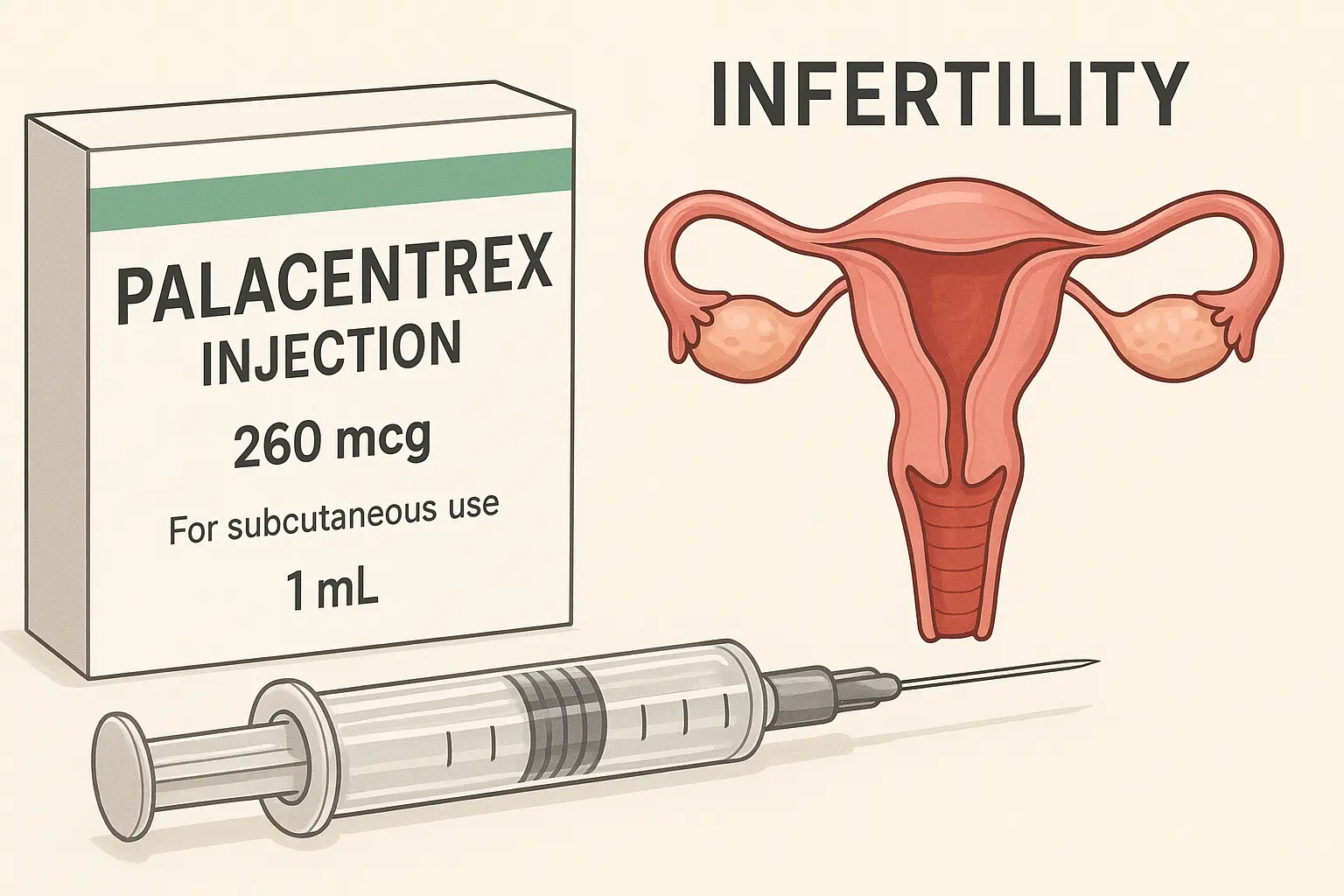Palacentrex Injection in Infertility: Success Rates, Mechanism, and Expert Opinions

A bioactive chemical derived from human placental extract, placentrex, is used for healing wounds, gynecological issues, and some dermatological conditions. With the growing concerns of infertility in both men and women, the use of Placentrex injection in treating fertility complications is increasing. Palacentrex Injection in Infertility is being explored in several regions as a potential therapy to support reproductive function, owing to its regenerative and anti-inflammatory properties that may help improve uterine health and enhance fertility outcomes.
In this article, we’ll explore what exactly Placentrex is, how it works, and the precautions when taking the injection.
What is Placentrex Injection?

Placentrex injection is a medicinal product made from the extracts of the human placenta. The elements of placenta have been found helpful in tissue repair, pain relief, and wound healing. The anti-inflammatory properties of the placental extracts make it useful for reducing inflammation as well as treating gynecological issues in women.
Usually administered in small amounts as an injection through the vein or muscle, Placentrex is also available as gels and creams. However, it is important to note that Placentrex injections are not approved by the FDA, and caution is advised while using unapproved placenta-based products.
The lack of approval from the FDA means the safety and efficacy have not been evaluated by the U.S. Food and Drug Administration. Hence, it is not a standard, approved medicine used in treatment in the U.S..
How Placentrex May Help in Infertility?
The Placentrex injections are considered to be helpful in fertility by promoting tissue repair, improving blood circulation, and reducing inflammation in the reproductive organs.
Placentrex injections are not used as a primary fertility medication, but as an adjunctive treatment measure. These injections help in improving endometrial health, enhancing ovarian functions, reducing inflammation and oxidative stress, and supporting successful implantation.
- Improves Endometrial Health
Through promoting cell regeneration, enhancing blood flow, and reducing swellings and inflammations in the uterus, placentrex improves endometrial health. The bioactive peptides and growth stimulators repair the endometrial tissues. It is also believed to increase the thickness of the uterine lining, which can contribute to successful embryo implantation.
- Enhances Ovarian Function
The regenerative, immune-modulating, and anti-inflammatory properties of placentrex help in treating conditions like ovarian cysts, pelvic inflammatory diseases, age-related decline of ovules, etc., thereby enhancing ovarian function.
- Reduces Inflammation and Oxidative Stress
The amino acids, peptides, and other growth factors present in Placentrex promote tissue repair and thereby activate the body’s natural defense mechanism. It reduces swelling and inflammation by inhibiting the activity of pro-inflammatory chemicals.
- Supports Implantation Success
It thickens the uterine lining and improves the blood flow to the uterus, which is highly helpful in the successful implantation of the embryo. It contains growth factors and nutrients necessary for the implantation.
Research Evidence and Effectiveness
The studies and research conducted on the effectiveness and efficacy are still under ambiguity. While some studies show the benefits of placentrex in dealing with infertility-related gynecological issues, strong supporting evidence and clinical trials conducted on a large scale are lacking.
With the available resources, Palacentrex Injection in Infertility treatments are promising. However, it is not a standard, evidence-based treatment measure. Also, it is important to note that Placentrex injections are not globally recognized medicines. Hence, it is crucial for individuals considering Plancetrex injections to discuss all the aspects, including the potential risks, with a fertility specialist before undergoing the treatment.
Palacentrex Injection in Infertility: Dosage, Administration & Treatment Duration
Administered as intramuscular or intravenous injections, the dose of Placentrex is decided by the doctor, based on the level of infertility of the patient. It should only be given by qualified medical practitioners and is never to be self-injected. The dosage and frequency of injection may vary according to the patient’s response and progress to the treatment.
Results depend on the condition and extent of infertility, as well as how the body reacts to it. Certain people may notice improvements within 1-2 weeks, while in other cases, it may take up to 4-6 weeks of treatment. The use of Placentrex during pregnancy is not recommended as there are inadequate data regarding its safety in this situation.
Palacentrex Injection in Infertility: Possible Side Effects and Precautions
Mostly, people tolerate Placentrex without any negative impacts. However, rarely, it may produce certain side effects, including:
- Swelling or pain in the injected area.
- Redness and rashes around the injected area.
- Allergic reactions.
- Difficulty breathing.
- Chest tightness.
- Hives or rash.
- Swelling on the face.
It is recommended to avoid this injection in the following situations:
- If you are pregnant or breastfeeding.
- If you are taking medications for kidney or liver problems.
- If you are allergic to the components of the placenta.
- If you are having active infections.
- If you have certain medical conditions like autoimmune diseases, blood clotting disorders, or even certain types of cancers.
Who Might Benefit the Most?
Placentrex injections may be beneficial for individuals with infertility issues, reproductive health concerns, slow-healing wounds and ulcers, burns, arthritis, poor joint health, and a weaker immune system in certain cases. Make sure that you always consult a doctor before planning to take Placentrex injection, to see if it is suitable for you.
Palacentrex Injection in Infertility: Final Thoughts
Placentrex may aid fertility by supporting uterine repair and hormone balance, but evidence remains preliminary. So, consult a fertility specialist before beginning the treatment.
Frequently Asked Questions
Placentrex is considered to support fertility by repairing the uterine walls and creating a favorable environment for implantation.
Yes, Placentrex can improve the sperm quality and quantity in men.
Commonly used injections to treat female infertility include gonadotropins (FSH and Menopur), GnRH antagonists (Cetrorelix), trigger shots (hCG), and progesterone injections.
If you are allergic to placenta-based products, if you are pregnant, or if you have severe kidney or liver diseases, Placentrex injections may not be suitable for you.
Yes. Placentrex injections, along with other IVF treatments, improve the chances of pregnancy.
